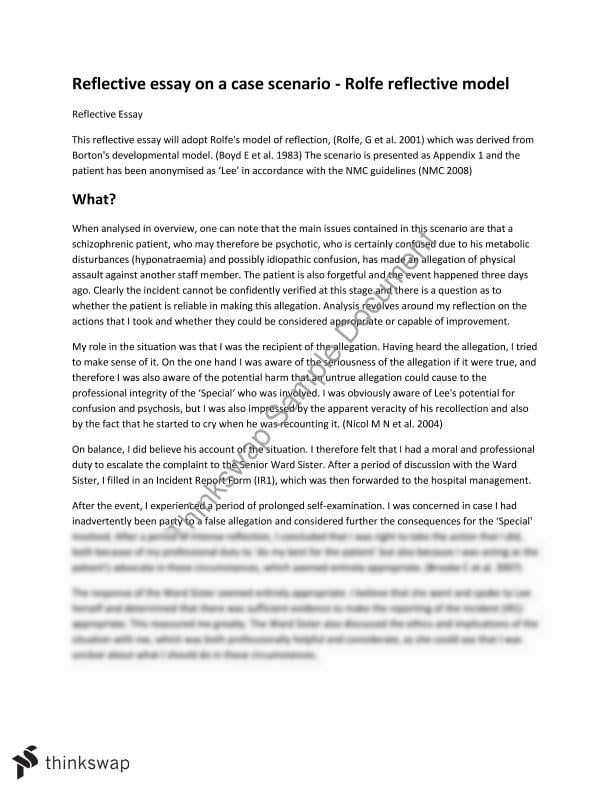
Reflective writing is used by different healthcare professions in various ways, but all reflective writing requires that you think deeply and critically about an experience or a text. At the centre of reflective writing is the “self” – including a deep analysis of you in relation to the topic. Reflective writing is a process that involves recalling an experience or an event, thinking and deliberating about it, and then writing about it · Basically, nursing essays can be divided into different types. The most common ones are analytical and reflective essays. These two styles are the most suitable for nursing papers. They either argue a particular perspective (analytical) or base the narration on previous experiences (reflective) · Gibbs’ Reflective Cycle: Examples of Reflective Writing for Nurses. Reflective writing is one of the most effective ways to build critical thinking capabilities. This helps us understand why we have to take a quick action in a certain situation. In this way, we learn how to document occurrence of an incident during initial stages of our professional career
Theory of Reflective Practice in Nursing
Have you ever been asked to reflect on a text or an experience? Reflective writing is used by different reflective writing in nursing professions in various ways, but all reflective writing requires that you think deeply and critically about an experience or a text. Reflective writing is a process that involves recalling an experience or an event, reflective writing in nursing, thinking and deliberating about it, and then writing about it.
You may be asked to engage in reflective writing related to an array of topics: the reading you are doing for a course, your experience working in a group, how you solved a problem, how you prepared for class or for an exam, a healthcare issue or a new theory.
You will be expected to reflect on your clinical practice often throughout your nursing studies and for the rest of your nursing career to grow, learn, and demonstrate your continuing competence. Although there are many ways to reflect, one common framework called LEARN was developed by the College of Nurses of Ontario See Figure 4.
Figure 4. Variations of this acronym have been taken up, but it essentially stands for:. Look back. Recall a situation that was meaningful to you in your practice. Describe the situation from both an objective and subjective perspective e. Who was involved and what interactions were observed? What did you think and feel?
Examine how and why the situation happened the way it did. Think about it in the context of your nursing courses and the literature. Consider how and why your practice should remain the same and how it should be changed. Think and move forward. What will you do differently when a similar situation arises? More reflective writing in nursing, reflective writing has been described in the context of narrative writing in which you engage in personal and professional storytelling.
A narrative approach to reflective writing asks you to think about storied elements e. How did the situation begin? Who was involved? Where did it take place? What emotions were people feeling? How did the situation end?
As you can see, these types of questions can easily be integrated into the LEARN framework too. You will be expected to engage in reflective writing throughout your nursing program, reflective writing in nursing.
Sometimes you will be asked to use the LEARN framework or another approach. Here are some tips on good reflective writing:. Graduates or senior-level students will tell you that reflective writing changes over the course of reflective writing in nursing program. As you advance, your forms of reflective writing will evolve from descriptive to more analytical. You will be expected to refer to the literature to explain your analysis and support your claims. You should also always engage in reflection in the context of the courses that you are taking.
Some courses focus on the personal self; others focus on the professional self, as well as nursing in the community or on a broader societal level. Think about a healthcare event that you encountered or a health and illness experience of a friend or relative that is meaningful to you.
In reflecting on this experience, how could you apply the LEARN format? College of Nurses of Ontario Professional profile: A reflective portfolio for continuous learning. Toronto: CNO. The Scholarship of Writing in Nursing Education: 1st Canadian Edition by Jennifer Lapum, Oona St-Amant, Michelle Hughes, Andy Tan, Arina Bogdan, reflective writing in nursing, Frances Dimaranan, Rachel Frantzke, and Reflective writing in nursing Savicevic is licensed under a Creative Commons Attribution-ShareAlike 4.
Skip to content Chapter 4: Types of Writing. The growth of reflection Graduates or senior-level students will tell you that reflective writing changes over the course of your program.
Thinking deeply and critically about an experience. Exploring and analyzing a clinical experience. Previous: Descriptive Writing. Next: Analytical Writing. License The Scholarship of Writing in Nursing Education: 1st Canadian Edition by Jennifer Lapum, Oona St-Amant, Michelle Hughes, Andy Tan, Arina Bogdan, Frances Dimaranan, Rachel Frantzke, and Nada Savicevic is licensed under a Creative Commons Attribution-ShareAlike 4. Share This Book Share on Twitter.
Learn How to write Nursing Reflection Assignment - My Assignment Services
, time: 5:04Nursing Reflective Journal Assignment Sample - My Assignment Help Oz Australia

· 0 Comments. Reflections are a complex part of the nursing profession and help the healthcare professionals in projecting their deep and true feelings encountered while practicing their profession. They provide a platform to the nursing staffs for self-introspection and projection of their true feelings. Writing reflections in the nursing curriculum helps the students in analysing the · Basically, nursing essays can be divided into different types. The most common ones are analytical and reflective essays. These two styles are the most suitable for nursing papers. They either argue a particular perspective (analytical) or base the narration on previous experiences (reflective) 1 EXAMPLE REFLECTIVE ESSAY FOR Critical Thinking and Writing for Nursing Students Bob Price and Anne Harrington This example of a reflective essay is presented in association with Price, B and Harrington, A () Critical Thinking and Writing for Nursing Students, London, Learning Matters

No comments:
Post a Comment